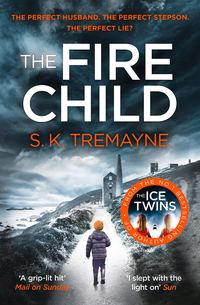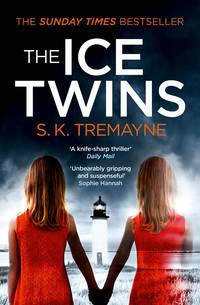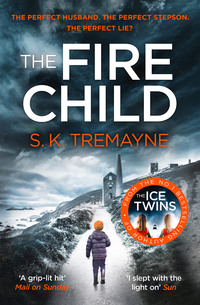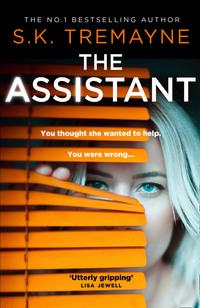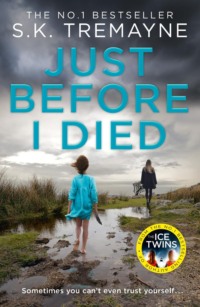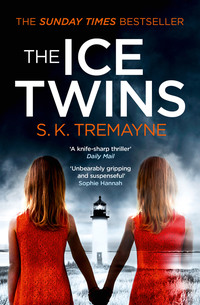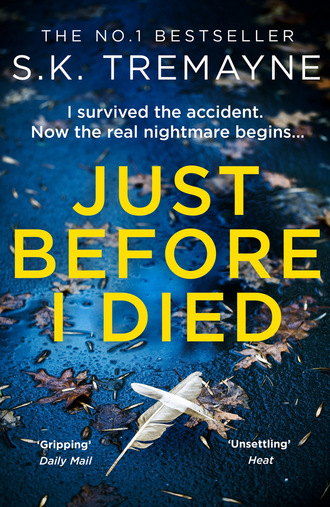
Полная версия
He looks at me, frowning. ‘Hags? Old women?’
I turn the stone in my fingers, calming myself. ‘They also called them hex stones. Because they were thought to be apotropaic.’ I don’t wait for his question. ‘Apotropaic means they were used to ward off evil, to thwart black magic. People placed them by windows and doors to stop witches getting in.’ Even as I replace the stone, very carefully, next to its sisters, I can’t help glancing at my desk. ‘Or … or to stop them from getting out. And somebody arranged these stones, in a line on our window ledge, overnight? That must have been deliberate.’
Andy stares at the stones. The rainy light outside is almost entirely gone. But I can see Lyla in the back of my new car. She is sitting up rigid, and gazing straight at me. Unblinking.
The Lych Way
Tuesday morning
Adam had been walking this path for ten minutes, deep in thought, before he realized he was on the Lych Way. The old corpse road, named for when the Dartmoor villagers were forced to carry the coffins of their dead to the official parish church, right across the moor at Lydford.
In the lee of a biting wind, beside a stand of dark pines, he paused, imagining the scene – a dozen ragged peasants hefting the wooden box from Bellever Tor, over the Cowsic brook, up and down the bleak, shaved hills, Lynch Tor, Baggator Clapper, the Cataloo Steps.
And when the river was running high at Cataloo, what did they do then? They must have waded waist-deep into the freezing water, holding the coffin over their heads, before heading up Corpse Lane to Willsworthy. All so they could deliver their dead to the decreed resting place.
Twelve miles they carried those corpses. Twelve bloody miles.
Walking on, Adam scanned the horizon, watching for wildlife, seeking solace in the landscape. As he topped a rise, a kestrel caught his eye, hovering in the white winter sky. Instinctively, he stopped to admire the tremendous skill of the bird, that delicate trembling of the tips of its feathers, exquisite, masterful.
Windfuckers, his uncle used to call them, kestrels were windfuckers, because when they rode the wild air it looked as if they were fucking the wind – possessing it, owning the breeze, followed by that sudden climactic rush of a dive, a frightening swoop on some prey, then gone.
He paced on, still following the Lych Way, the old way of the dead, guessing that the cross should be along here somewhere, near the Iron Age settlements.
We saw a stone cross had been vandalized, on the road by Sittaford, that’s what the hiker who called it in had said.
But it was difficult to focus on the job. His mood was darker than the pines. He was trying his hardest, but today he couldn’t lose himself in Dartmoor. The human world pressed around him, the unfurling, uncontrollable emotions he felt for his wife, the sense of resentment he tried to hide for the sake of sanity, for the sake of his daughter. But how was he meant to hide this kind of emotion? What she’d done, and what she’d said, and what she had so conveniently forgotten. How was he meant to cope with that and pretend it didn’t matter?
All he’d ever wanted was to live his life and love his family, and be happy in his job, tending the moors, repairing the hedges, helping the tourists, watching the buzzards above Sourton Down, and normally he was happy. They had all been so happy. Yet now his family was crumbling.
Approaching a stile, Adam paused, vaulted, and took a deep cold breath, before striding on, the squared green conifer plantations falling far behind him. He was trying not to think of his family, trying not to surrender to despair, or to this growing dislike, whirled with guilt. Even as he loved and desired his wife, he felt a surging fury towards her.
Lyla. What was all this doing to Lyla?
He closed his eyes to steady his surging emotions, then looked across the landscape once more.
He could see the greener, emerald turf of a bog to his left, the faint sparkle of soggy acid grass, flashing in a break of winter sun. A memory returned: he was eight, or nine, with his Uncle Eddie, crouching to watch a snipe, right here, performing its nuptial display, the bird rising fast and steep in the air, then abruptly stooping and diving with its wings scarcely open, the tail delicately flared, making that strange noise. That sad, thrumming sound of the outspread tail feathers, vibrating in the dive. Once heard, never forgotten.
And on the way home from these days of learning about the birds and rocks and streams, his uncle would teach him the old moorland words:
Dimmity, meaning twilight. Owl-light, a darker kind of dusk. Radjel, a pile of rocks. Spuddle, to mess about. Tiddytope, a wren. Gallitrop, a fairy ring.
Appledrain, a wasp. How beautiful was that?
Moor-gallop: wind and rain moving across high ground. Drix: brittle wood. Ammil, a fine film of silvery ice that rimes the leaves and twigs and grass when a hard Dartmoor freeze follows a deceptive Dartmoor thaw, like an ice-storm, but more delicate. That was how precise the farmers had to be: they had to have words to describe the most beautiful and unusual states of frost and thaw and ice. Because lives depended on this precision: knowing when to gather the cattle, shelter the ponies, tend the struggling crops, nurse the suckling lambs.
Another, bigger, stile. Catching his breath before he clambered over, Adam stopped, and gazed to the horizon.
Every inch, every square mile. He’d seen it all so many times, and still he loved it. The grouse over Steeperton in the autumn, feeding on ling, and whortleberry. The glades of Deeper Marsh, with its alder buckthorns, where the yellow butterflies come to feast, heralding the late Dartmoor spring. The caves of Cuckoo Rock, where the smugglers once cached their brandy. And the great empty spaces of Langcombe, where he would tramp on a summer day: out there where you could imagine you were the only person in the world, with a featureless expanse of wafting grass and sedge all around you, mile after mile of nothing, no one to be seen, nothing to be done, the sun beating down, and all you could hear was the whirr and murmur of insects: that, and the silent moving clouds, and your own beating heart.
Those were probably his happiest moments; those, and when he was out with Lyla, teaching his little girl about the ravens and rock basins, the damselflies and purple orchids. She loved the moor as much as him. They spent endless sunny hours, walking the Abbot’s way, down to Rundlestone, or looking for the old blowing house, by the King’s Oven, or hunting for blackberries, up by Dunstone, and Shilstone, their lips and fingers purple, their teeth bright pink, and laughing – and then, at the sweet weary end of these days, they would drive home to Huckerby, and Kath would have passed by a supermarket, and they’d all sit and have tea, and a plate of fruitcake, and they were all happy. And Lyla would make clever patterns with the pretty petals she’d collected, arraying them on the kitchen table. Beautiful, complex patterns that only she truly understood. Or patterns she made for Daddy.
They were once so very happy.
And now it was all different. Now Lyla was confused and scared and sad, and often she wouldn’t let him – her own father! – hug her like he used to. These days Lyla sometimes gazed at him as if he’d done something wrong, all because of Kath, that Kinnersley family. All of them. And yet at other times – before bed, before sleep – Lyla sometimes hugged her dad so very close, so desperately close, it was like she was scared he too would disappear in the night – like her mother.
This was no good. Adam tried to drive the spiralling, dangerous thoughts from his mind. It was as if they were all being sucked into a Dartmoor mire: Dead Lake, Fox Tor, Honeypool: the more they struggled to get free, the deeper they sank into frustration, and anger. The best thing was to calm yourself. Not make it worse. Not to do anything rash.
Adam could see the old cross now. A metre high, with a weathered and lichened green-grey granite disc at the top. Probably Anglo-Celtic, probably a thousand years old or more. Someone had hit it pretty hard, knocking it over, probably some fool in an SUV, drunk or skunked, driving offroad and having a laugh. The disc of the cross was cracked and shattered; it had survived so many centuries and now it was grievously damaged, possibly irreparable. Something good had died.
Adam knelt beside the antique stone, stroked the cold granite as if it was the mane of an injured foal. Feeling the scratchy roughness of the lichen under his hands, feeling utterly helpless. Trying not to feel any more futile emotions. Trying to be practical.
Rubbing air between his raw fingers to keep out the winter chill, he stood up and began the long walk back to his Land Rover, and as he did so he made his decision about the cross. No matter how difficult, they would try to repair it. Because that was his job: to preserve this precious place, from the antiquities to the landscape to the chittering fieldfares at Soussons. To preserve as much of it as possible, and hand it on to the next generation, to Lyla, to Lyla’s children.
He would call the archaeology department at Exeter, get them to send an expert. Yes. It could be saved.
If only love were the same, he thought as he headed down the corpse road. If only love could be repaired, re-erected, restored. But once you smashed up loyalty, smashed up a loving family, that was it, wasn’t it? And what if that love was replaced by suspicion, even contempt, what did that do to you? Where did that lead you? In what dark, dark wood did you wake up? Perhaps the path you took might lead you even deeper into darkness.
Adam had nearly reached the Land Rover. He could see another kestrel, hovering in the cold air, framed by the pale green heights of Hurston Ridge. The bird was so beautiful, so perfect, quivering, elemental, doing precisely what it came here to do. Trembling with intent, with a fierce and irresistible desire to kill; to survive.
What did Kath do that night, and all the nights he was away? The question was simultaneously unapproachable and unavoidable. If he got to the answer he might get the measure of her guilt – and their marriage would be over. If he didn’t, he would seethe with speculative rage forever, and their marriage would be over.
And either way, Lyla ended up without a mother. So probably he should let it go; yet he could not. He loved her, he hated her, he loved her, he hated her. The confusion of emotion was like a wet moorland fire, making smoke rather than heat: it choked him. It killed his hopes, smothered things forever.
As he opened his car door, Adam remembered what his uncle used to say about the wilderness of Dartmoor, as they castrated the rams and dehorned the shrieking cows, as they took the frightened, lowing bullocks to the blood-slicked slaughterhouse, where the sheets of blood shone like a gorgeous lacquer, in luxurious swirls of scarlet and purple.
The moor is beautiful, lad, because it is dangerous.
Huckerby Farm
Wednesday morning
Today is another inset day. A training day for teachers at Princetown Primary, when the kids get a day off. These days come around every so often, and it means that one of us – Adam or me – has to clock off work, to look after Lyla, one-on-one. It’s always intense, because Lyla has no proper friends; play-dates are out of the question.
But I still, usually, look forward to the chance to bond with her. To take her out on the moors, go for a summer swim, or autumn horseriding. But today is dank, and very chilly. It might even snow.
And my mind is elsewhere, and perhaps Lyla senses it. I am thinking about the hag stones left on the window ledge at my office. Could be it really was a hiker who set them down for a moment, and forgot. Could be it was kids having a laugh. But did they know the stones symbolized the driving away of witches? And why did they choose my office?
As I pensively clear the breakfast plates, my daughter kicks the table leg. Kick kick kick. Kick kick kick. She wants her mother’s attention.
And she deserves it.
‘What can we do, Mummy?’
‘I don’t know, darling, it’s a horrid old day. Something indoors? Like Castle Drogo?’ Kick.
‘It’s nice there, Mummy, but they don’t like dogs. Can we please do something else?’ She looks at me yearningly. ‘With Felix and Randal?’
I struggle to think. Look at a good map or a detailed guidebook and there are so many enticing places on Dartmoor, so many places with fairytale names – the Lost Crosses, Hameldown Daggar, Quintin’s Man – but today I am not enticed. Lyla needs to be entertained, diverted, though. I don’t want her spending the entire day lonely, lost in books. Not again.
An idea forms.
‘I know,’ I say, with a studied brightness, ‘Let’s go somewhere to see the standing stones you like.’
Her face brightens: she loves Dartmoor’s ancient circles and menhirs.
‘Merrivale? Scorhill?’
‘No,’ I say, slightly mischievously. ‘Somewhere you haven’t been before.’
She beams with delight. ‘Where? Tell me!’
‘Hah. No.’
‘Tell me, Mummy!’
‘Get ready, and I’ll make a picnic and we’ll go on a mystery tour! Put your boots on, and a coat. Everything else is fine.’
My daughter looks down at herself: she’s wearing a pair of black jeans, and a grey shirt, with a yellow pullover. She always mixes up colours wildly, I’m not sure she understands how clothes go together, yet she usually gets away with it, with her father’s blue eyes, his pale, nearly Slavic cheekbones, and that dark, dark hair. That beauty. I remember the boy I saw in the pub when I was seventeen, the boy I have loved ever since, the blue-eyed boy who gave me this blue-eyed girl. Adam Redway, my childhood sweetheart.
‘Do I really need boots? I hate wellies, they’re scratchy.’
‘Yes, you do. It will be wet in the bogs, and muddy. So go and get your things and I’ll pack some sandwiches.’
‘Peanut butter? So it’s a Special Occasion!’
I laugh. Lyla laughs. Whenever we go on a jaunt we always take peanut butter sandwiches: the comic predictability is a family in-joke. Jumping up from her chair, Lyla runs out of the kitchen, shouting out to Felix and Randal, who are slumbering in the living room, ‘Felix! Randy! Going on a walk! Big huge walk!’
I hear her scamper upstairs and the dogs canter after her, their claws skittering on the wooden steps.
Ten minutes later I’ve packed a hasty picnic in a bag, dropped the bag in the car boot, the dogs are jumping in the back seat, on either side of Lyla, and I have the key in the ignition. We’re having a day away from Huckerby Farm. My intent is Grey Wethers, a pair of poetic stone circles on the far eastern edge of the moor. Merely getting there will be a high adventure. It will take up the whole day. A good day outdoors with the dogs, even if the cold and gloom persists.
As I reverse the car, Lyla says, from the back seat, ‘You know … I saw a man.’
I trundle the car down the lane, towards what passes for a road in remoter Dartmoor. ‘Sorry, darling?’
‘I saw a man.’
The tension tightens inside me. I slow the car to hear my daughter better. ‘When, darling, what man?’
I’m looking at her in the mirror, but her face is averted. She is tickling Felix behind his ear. For a long while she says nothing.
‘Lyla?’
I drive at about five miles an hour through the squelch of a wintry Dartmoor day, over tiny medieval bridges never meant for cars.
At last she says, ‘It was a man that you know. I saw him at Huckerby. Near Huckerby.’
Who can she mean? It seems important but I don’t know why. She could be referring to anyone; she might be recalling a dream.
‘When, Lyla-berry? And what did he look like?’
‘Two or three times. I don’t know, he was far away. He looked …’ She squirms, ‘He looked a bit like Daddy. A lot like Daddy. And I think he was there the night you went to …’ Her voice is trembly. ‘The night. That night. When you left me with Auntie Emma.’
This is Lyla’s name for our neighbour, Emma Spalding. Emma was looking after Lyla when I was working late: the night I skidded into Burrator. Emma has been like an aunt, or like the grandmother Lyla never had, because Adam’s mum died years ago, and both my parents are gone.
We drive on. The roads are a mess of mud and fallen leaves. What is Lyla saying? That she saw a friend of mine that night, and she’s seen him since, near Huckerby? Or does she really mean Adam? It is impossible. My own husband is not following me. Could it be someone that looks like him, though? Harry? Or one of his many other cousins? The Redways are scattered across the moor.
But why would anyone follow me?
I slow the car down, my hands firm yet feeble on the wheel, gazing out of the window, trying to work it out.
The trees bend in a cold wind, tatters of grey moss fluttering. Birds hide among the leafless twigs. The only colour apart from dull grey and green is the shivering yellow of gorse flower.
In the mirror, Lyla’s face is rigid. I know this mood, what it means: she doesn’t want to speak. At its worst she can go into total and prolonged silence. Elective mutism. Another Asperger symptom. But I can’t let it go. ‘Lyla, this is very important. You say you saw someone I know.’ She is mute.
We turn on to the main road to Widecombe and Fernworthy, the faster road. And almost immediately, I slow. Dartmoor ponies, their rich black manes rippling in the breeze, are standing on either side of the tarmac. In this pose they always strike me as guardians of the moor, essential spirits of the place. ‘Lyla? Please?’ Nothing.
‘Lyla—’
‘It was the day you left me.’ Her blue eyes meet mine in the mirror, and they are piercing, ‘The day you left me alone. You must remember that day, Mummy.’
Her face goes still again, still and quiet and pale. Even angry. And I know if I ask one more question she will not say another word for hours, or days. Or a week. Yet I am anxious to interrogate her further. What is she trying and failing to say? Is it something so unspeakable she cannot bring herself to say it clearly?
The words already spoken pain me quite enough. She seems to be blaming me for the accident. I want to tell her: it wasn’t my fault.
Foot down on the brake, I bring the car to a total halt as another pony crosses the road. Heedless of our presence, living in a different world, the pony trots along the verge, then canters away – over the brown crest of a hill, its rich mane flowing like a dark flame on the wind.
The scene reminds me of my daughter: with her black hair streaming on a cold blustery day, running with the dogs, happy in herself. Alone with her thoughts and dreams, and as mysterious as the weather beyond Haytor.
Grey Wethers
Wednesday lunchtime
It’s taken us an hour to walk here, through the serried pine plantations of Fernworthy, out on to the expanse of brown moorland.
‘There,’ I say.
‘Where?’
I point to Grey Wethers, the two stone circles, barely visible in the distance, set on a slope, staring at the nothingness all around them. Grey Wethers is one of my favourite places on Dartmoor: there’s something poetic about the silent, twinned nature of these circles, raised three thousand years ago by men who knew how to use a landscape, how to adorn it, respond to it, with simple rings of grey moorland rock.
Grey Wethers is as beautiful, to me, as a palace or a castle. The only reason I don’t come here more often is that it requires a long and boring walk, first through regimented conifers, then hopping over quaggy ground, boots sinking into unsuspected pools of stagnant, cressy water, shins cracked on hidden moorland boulders.
‘What do you think?’ I say. ‘It’s kind of lovely, isn’t it?’
I scrutinize her passive face for clues. Who did she see at Huckerby? If it is someone I know, that makes it even more bewildering. I barely have any friends – let alone male friends – who live nearby; my old university friends are mainly in London, or scattered around the world.
So she must mean a relative of mine. And I have so few contenders. My brother is down at Salcombe, in my mother’s house. We like the distance between us; it prevents us squabbling. As for my father, he is long dead.
It keeps coming back to someone who looks like Adam, as Lyla said. The man on the moor. Or could it be Adam himself?
No, absurd.
In silence, we approach the nearest of the circles. The dogs are running ahead; for once Lyla is not interested in their romps and explorations.
Instead she frowns gently, puzzled, gazing first at the stones, then at the horizon, alert to something. Finally my daughter walks to the centre of the nearest stone circle. And sits down.
‘Are you all right?’
She nods. I sit down beside her, cross-legged. The cold wind has dropped and a feeble hint of January sun pierces the cloud cover. The turf beneath us is quite dry. Apparently it hasn’t rained here for weeks. Dartmoor weather is so strange. Adam says that on July days he can leave tourists sunbathing by a moorland river, then walk ten minutes up a tor – and be hit by driving snow; yet when he walks back, the kids in the valley are still swimming in the sunshine.
‘Shall we have a sandwich?’
Lyla says a quiet please. I unbuckle my rucksack and take out the picnic box and for several minutes we eat our peanut butter sandwiches in companionable silence, listening to the whirr of the gentle wind in the sedge, and the trill of a cold moorland stream in the distance. I can also hear the dogs, barking happily over the next shallow hillside, hunting out rabbits, or hares. Or digging up old human bones from Stone Age cairns. Kistvaens. Those chests containing ancient skeletons, where the bodies were cruelly bent to fit them in: knees pressed to chin, as if the burial was a torture in itself. Perhaps they buried some alive. No one is quite sure.
Setting down her sandwich, Lyla says, ‘I’m sorry for what I said about the man. I don’t think I saw anyone. Sorry, Mummy. I get scared?’
‘Ah … OK.’
Confusion settles upon confusion. I begin to fear that one day I may wake up, trapped, snowbound by all this strangeness. But Lyla is still traumatized by her mother nearly dying; confusion would be understandable. Expected.
Taking another bite of bread and peanut butter, she chews diligently, and says, ‘I like it here. I like the silence and the forests over there, so far away. I always like the stone circles.’
‘That’s good.’
‘I like Scorhill and Totterton and Sourton and Buttern Hill and Mardon, all of them, but they’re not the best ones. Do you know my favourite?’
‘No …’ I am wrapping the sandwich foil into a ball, putting it back in the box. ‘But tell me.’
‘Merrivale!’ she says, smiling brightly.
I smile in return. We’ve been to Merrivale several times: it’s definitely one of her cherished places on the moor. Merrivale, with its stone rows and burial cairns, arrayed along a bald and windswept crest of moorland.
‘Why do you like Merrivale?’
‘Because they called it Plague Market! I read that was its name. Do you know why it was given that name? I had to look it up.’
‘No.’
Her eyes turn to meet mine, unblinking. ‘During the Black Death, the moorland people would leave food in the stone circle. And later the coastal people, all the people who had the plague already, they would come and take the food, and leave gold and silver as a payment, in a trough full of vinegar, then they would go away. And that’s how they tried to stop it, stop the Black Death spreading.’ She blinks, once, and goes on. ‘Isn’t that amazing? A special plague market, on the moor, between the stones, where no one had to meet, so no one saw anyone else, like they were all ghosts. And all that gold and silver in the vinegar.’ Lyla frowns, toying with a blade of grass, ‘But … but it didn’t work, that’s what I read. The Black Death spread anyway, right across the moor. So all the people died. Even when you leave gold in vinegar, Mummy, it doesn’t work. Everyone dies.’


